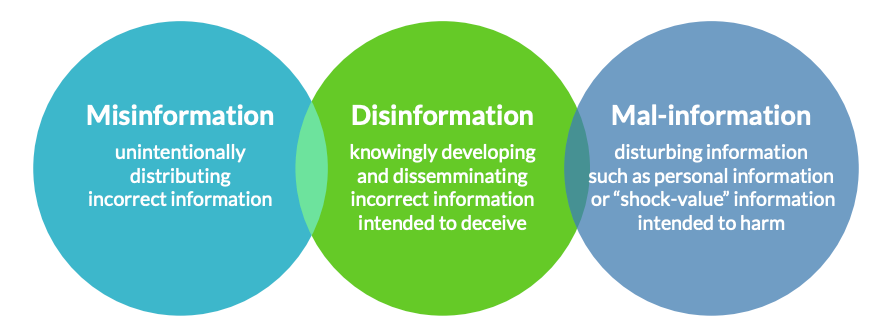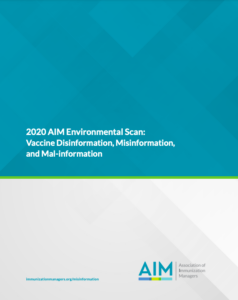Incorrect vaccine information is the single biggest issue in immunization today. Vaccine confidence and support have suffered over the years as incorrect information is more widely disseminated. AIM has compiled correct information about vaccines for public health practitioners and providers to use in their outreach and education efforts.
Types of Incorrect Vaccine Information

There are three types of incorrect vaccine information:
- Misinformation: unintentionally distributing incorrect information
- Disinformation: knowingly developing and disseminating incorrect information intended to deceive
- Mal-information: disturbing information such as personal information or “shock-value” information intended to harm
Environmental Scan
To create more targeted messages and identify key resources to combat incorrect vaccine information, AIM solicited the development of an Environmental Scan.
This scan was conducted from February 2020 to June 2020, and observed the vaccine information from May 2017 to May 2020 that were published and disseminated across the social ecology. Research was conducted across peer-reviewed journals, media articles, legislative bills, blogs, websites, social media, and other digital channels and a few in-depth interviews.
In 2021, another environmental scan was conducted focused on incorrect information related to COVID-19 vaccines.
Environmental Scan Key Findings
- Types of incorrect vaccine information: The majority of incorrect vaccine information produced is disinformation, not misinformation.
- Vaccine hesitancy: The majority of vaccine hesitancy begins with a kernel of truth, is fed by incorrect vaccine information, and is rooted in anxiety.
- Incorrect vaccine information producers, responders, and interpreters: The producers and influencers of incorrect vaccine information mainly reside in the individual, interpersonal, and community environments.
- Incorrect vaccine information categories and themes: The majority of incorrect vaccine information falls into three categories (safety, conspiracy, pseudo-science) across eight themes.
- Incorrect vaccine information channels: The digital space is the primary source of vaccine disinformation.
- Information/resources to address incorrect vaccine information: Producers of resources to address incorrect vaccine information generally focus on four major activities, but there are still significant gaps.
- Strategies to address vaccine misinformation and disinformation: Inaccurate beliefs are difficult to change. Therefore, it is critical to proactively address dissemination of misinformation and disinformation.
- Beliefs on science and the role of media: Those opposed to vaccines and some vaccine hesitant parents have low trust in medical authorities and science. The perception that the vaccine opposition movement is larger than it actually is has been fueled by media attention.
- Incorrect vaccine information and politics: Individuals who oppose vaccination exist across political ideologies. There is vaccine legislation being debated in almost every state as well as on the national stage.
- Drivers of incorrect vaccine information: Many major organizations that oppose vaccination are personality- and sales-driven.



